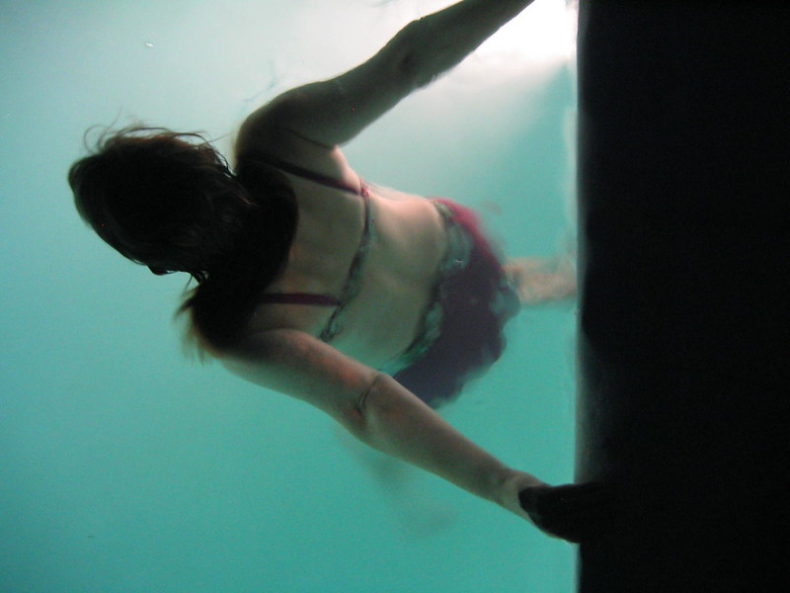
The other day I hovered over the computer as the clock counted down. Was I on the right page? Refreshing, refreshing, refreshing. Was I logged in? At 7:00 p.m., the screen changed, and I zipped around with my cursor, checking the open slots, trying to check the right box.
It wasn’t a vaccine appointment. It was a lap lane.
I’ve always been an inconsistent swimmer. For many years, I moved so often that I never found a rhythm. It took me a while to get the lap swim schedule down—and then the snow would fall, or I’d start training for a long run, or move again. In the last few years, I only swam when I was pregnant or nursing an injury. Last year, I’d been thinking about getting in the pool again, and then you know what happened. Once the pool did reopen, it seemed too complicated to navigate the sign-up system, too strange to follow the many new rules.
Then I read two books that made me want to take the plunge. The first, Bonnie Tsui’s Why We Swim, chronicles both the adventure and the science of swimming, and highlights research on how swimming changes both physiology and mood. Tsui also dives into the more subtle aspects of submersion: the stillness and presence found in moving through water, the way it brings us out of our busy minds and closer to the natural world.
The second book I read after listening to an interview with the author, Katherine May. Her recent book, Wintering, looks at how to reframe the darker, colder times in our lives as opportunities to retreat and rest. One of the chapters, “Cold Water,” talks about her explorations of cold-water swimming, which has been shown to decrease tension and fatigue, and improve general well-being. Even a quick plunge will do it: cold water immersion boosts dopamine levels by 250 percent.
Suddenly, everywhere I looked, I saw water. And I lingered. I took more walks to bring me close to the ocean. After surfing, I lingered, floating in the water next to my board, just looking up. And I put an alert on my calendar: swim signups, Mondays, 7 pm.
The first week I got two slots. And then it rained. It poured. The pool sent alerts that they would close because of high winds and thunderstorms. Maybe it wasn’t meant to be. Then, the next week two more slots were available—it would be late, and dark, but there was a lane.
As I got dressed to leave, I told my kids that I was worried. “I haven’t been swimming in so long,” I said. “And I’m not sure how it works.” Where do I stand? Do I have the right swim pass? Will it be ok that the bathrooms and the showers are closed? How different will the pool be? I’d known it to be a place of camaraderie, open to all, where the older women chatting in the showers showed me a different kind of story than the one that we often hear about aging, that the future can be strong, healthy, full of laughter and community. The need to make an appointment made the pool seem sterile and sheltered, and with some of the same barriers that have appeared around vaccines: I needed the internet and enough free time to figure out how to get one.
At the pool, I waited in the line. I didn’t have the right swim pass, but the lifeguard said he’d make me a new one. (“I’ve never seen this kind, has it been a while?” he asked.) I watched where people put their bags and towels on the side, I asked another swimmer whether we were allowed to use the kickboards. As a wise friend said, embarrassment is only the feeling of a moment you haven’t yet had the chance to meet.
The pool was turquoise. The palm trees swayed above in the darkness. I slipped into the pool, and it was all true, what my children said: you know how to swim already, you’re going to be really strong from surfing, you can do it. It was true that the pool was a different place: quieter, missing its laughter, its bright echo of voices. And it was true, what those beautiful books said: I went still inside, my mind emptied, and when the buzzer sounded, I felt both exhausted and made new.
*
Image by john ivar andresen via Flickr/Creative Commons license
Just beautiful, Cameron! Your essay reminds me of the poem “Morning Swim” by Maxine Kumin. Your “I went still inside, my mind emptied, … I felt both exhausted and made new” and Kumin’s “water fell / through all my doors. I was the well that fed the lake … ” gesture at a similar sense of renewal. Something we all need right now.
Thank you so much, Rachel! I think the Maxine Kumin poem was in at least one (if not both) of these books–I think it’s Why We Swim but I don’t have it in front of me.
Wonderful piece, rather inspiring, even for any like me who swim less effectively than rocks. Thank you for sharing. Your writing strikes me, as I admit other writings and comments I have heard for the past year, a bit more profoundly because of references to the COVID-19 pandemic. Some views…not necessarily yours…speak to what we need now primarily because of the pandemic. I would venture that the very things we find most needed…helpful…have been needed and helpful long before the current pandemic. If anything, I reckon the pandemic has perhaps provided an opportunity for any who are interested in being “more fully alive” to find those experiences, like swimming, and welcome them actively into our lives, often, ongoing.
Thank you so much, David. I have a feeling you would really like “Wintering”–I imagine it was written before the pandemic, and everything she writes about seems even more relevant now.